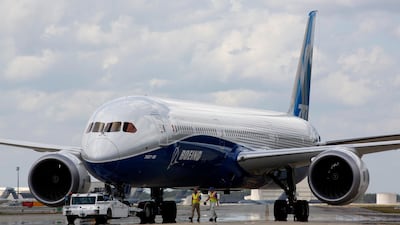Singapore Airlines said on Tuesday it had grounded two Boeing 787-10 Dreamliner jets fitted with Rolls-Royce Trent 1000 TEN engines after a fleet check found premature blade deterioration.
The aircraft have been removed from service pending engine replacement, the airline said.
The Trent 1000 TEN is the latest version of an engine that has had a problematic entry into service, Reuters reported. As of February, Rolls-Royce said 35 787s were grounded globally due to engine blades corroding or cracking prematurely. The manufacturer said it aims to reduce the number to 10 by the end of the year.
Jet engine fan blades are complex to design and manufacture but play a critical role in the performance of the power plant.
In February, the company raised a Trent 1000 accounting charge to £790 million (Dh3.78 billion) from £554m at the half year, contributing to a full-year operating loss of £1.16bn. It also allocated another £100m in cash to the problem.
On Tuesday, shares of Rolls-Royce fell as much as 2.7 per cent, and were down 0.5 per cent to 912.4 pence at 8.37am in London. Singapore Airlines rose 0.6 per cent to S$9.78 (Dh26.49) as of 3.35pm Singapore time, according to Bloomberg.
A discovery of early blade deterioration affected about 120 Trent 1000 turbines, or about 8 per cent of the global fleet, a source said in September. That was a further setback to efforts by Rolls-Royce to reduce the number of idled planes after flaws in the engine design led the company to record more than $1bn in charges.
Design glitches have plagued the Trent programme for two years and eaten into Rolls-Royce’s share of engines for Dreamliners against rival General Electric. The intermediate pressure turbine blades - which had been flagged for replacement - are not lasting long enough to meet the previously set maintenance schedule.
Customers of Dreamliners include Japan’s ANA, Air New Zealand, British Airways, Virgin Atlantic and Norwegian Air Shuttle.
Rolls-Royce said on Tuesday that since the entry into service of the Trent 1000 TEN, it had communicated to operators that the high-pressure turbine blades in the engine would have a limited life.
"Working with operators, we have been sampling a small population of the Trent 1000 TEN fleet that has flown in more arduous conditions," the manufacturer said in a statement. "This work has shown that a small number of these engines need to have their blades replaced earlier than scheduled."
Rolls-Royce said its engineers were already developing and testing an enhanced version of the turbine blade.
"We will now work closely with any impacted customers to deliver an accelerated programme to implement the enhanced blade and to ensure that we can deliver on our Trent 1000 TEN future commitments," the company said.
"We regret any disruption this causes to airline operations."

